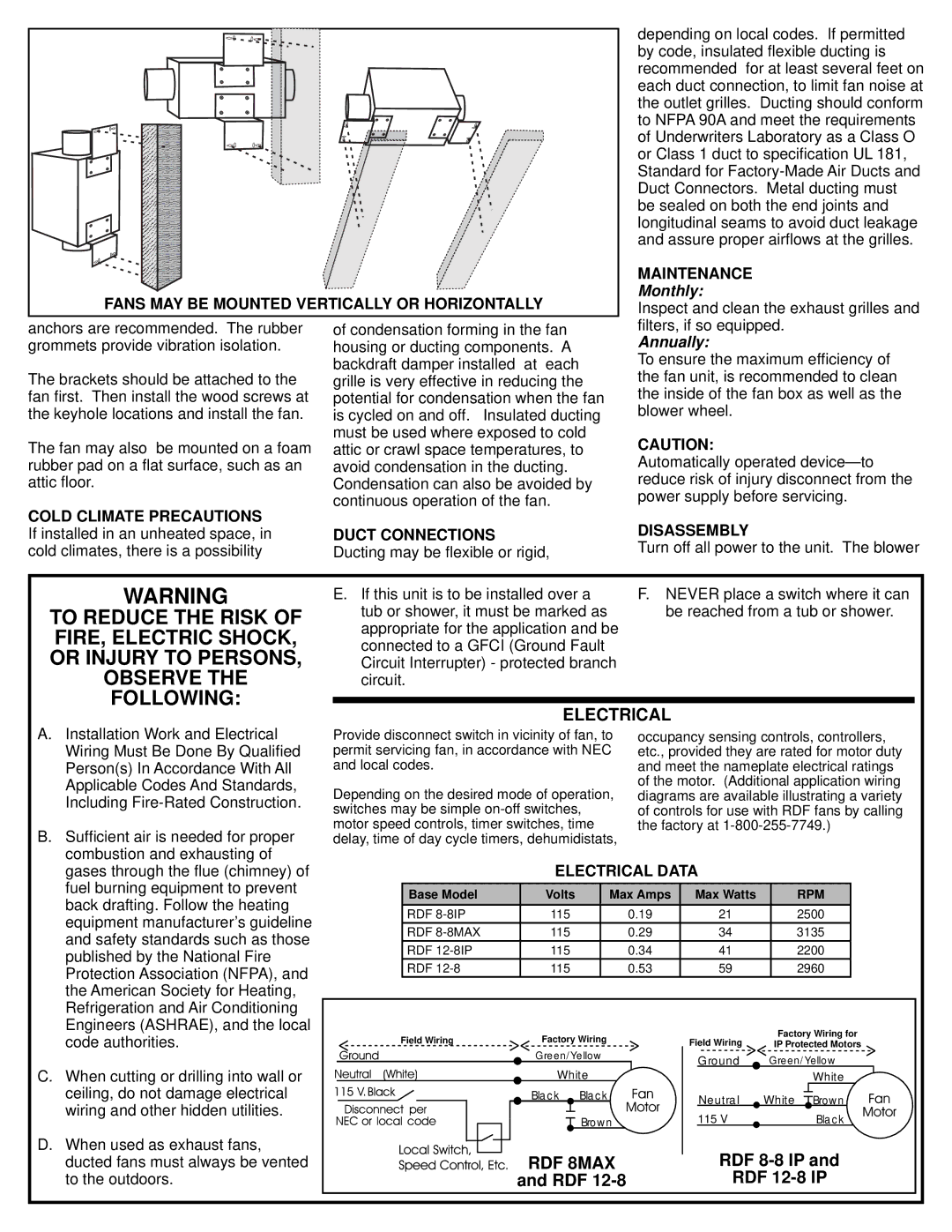
FANS MAY BE MOUNTED VERTICALLY OR HORIZONTALLY |
depending on local codes. If permitted by code, insulated flexible ducting is recommended for at least several feet on each duct connection, to limit fan noise at the outlet grilles. Ducting should conform to NFPA 90A and meet the requirements of Underwriters Laboratory as a Class O or Class 1 duct to specification UL 181, Standard for
MAINTENANCE
Monthly:
Inspect and clean the exhaust grilles and
anchors are recommended. The rubber grommets provide vibration isolation.
The brackets should be attached to the fan first. Then install the wood screws at the keyhole locations and install the fan.
The fan may also be mounted on a foam rubber pad on a flat surface, such as an attic floor.
COLD CLIMATE PRECAUTIONS If installed in an unheated space, in cold climates, there is a possibility
of condensation forming in the fan housing or ducting components. A backdraft damper installed at each grille is very effective in reducing the potential for condensation when the fan is cycled on and off. Insulated ducting must be used where exposed to cold attic or crawl space temperatures, to avoid condensation in the ducting. Condensation can also be avoided by continuous operation of the fan.
DUCT CONNECTIONS Ducting may be flexible or rigid,
filters, if so equipped.
Annually:
To ensure the maximum efficiency of the fan unit, is recommended to clean the inside of the fan box as well as the blower wheel.
CAUTION:
Automatically operated
DISASSEMBLY
Turn off all power to the unit. The blower
WARNING
TO REDUCE THE RISK OF FIRE, ELECTRIC SHOCK, OR INJURY TO PERSONS, OBSERVE THE FOLLOWING:
E. If this unit is to be installed over a | F. NEVER place a switch where it can |
tub or shower, it must be marked as | be reached from a tub or shower. |
appropriate for the application and be |
|
connected to a GFCI (Ground Fault |
|
Circuit Interrupter) - protected branch |
|
circuit. |
|
ELECTRICAL
A. Installation Work and Electrical |
Wiring Must Be Done By Qualified |
Person(s) In Accordance With All |
Applicable Codes And Standards, |
Including |
B. Sufficient air is needed for proper |
combustion and exhausting of |
Provide disconnect switch in vicinity of fan, to permit servicing fan, in accordance with NEC and local codes.
Depending on the desired mode of operation, switches may be simple
occupancy sensing controls, controllers, etc., provided they are rated for motor duty and meet the nameplate electrical ratings of the motor. (Additional application wiring diagrams are available illustrating a variety of controls for use with RDF fans by calling the factory at
gases through the flue (chimney) of |
fuel burning equipment to prevent |
back drafting. Follow the heating |
equipment manufacturer’s guideline |
and safety standards such as those |
published by the National Fire |
Protection Association (NFPA), and |
the American Society for Heating, |
Refrigeration and Air Conditioning |
Engineers (ASHRAE), and the local |
code authorities. |
C. When cutting or drilling into wall or |
ceiling, do not damage electrical |
wiring and other hidden utilities. |
D. When used as exhaust fans, |
ducted fans must always be vented |
to the outdoors. |
ELECTRICAL DATA
Base Model | Volts | Max Amps | Max Watts |
| RPM | |
RDF | 115 | 0.19 | 21 |
| 2500 | |
RDF | 115 | 0.29 | 34 |
| 3135 | |
RDF | 115 | 0.34 | 41 |
| 2200 | |
RDF | 115 | 0.53 | 59 |
| 2960 | |
Field Wiring | Factory Wiring | Field Wiring | Factory Wiring for | |||
IP Protected Motors | ||||||
| Green/Yellow | |||||
| Ground | Green/Yellow | ||||
| White | |||||
|
|
| White | |||
| Black | Black | Neutral | White | Brown | |
|
|
| ||||
|
| Brown | 115 V |
| Black | |
| RDF 8MAX | RDF | ||||
| and RDF | RDF | ||||
